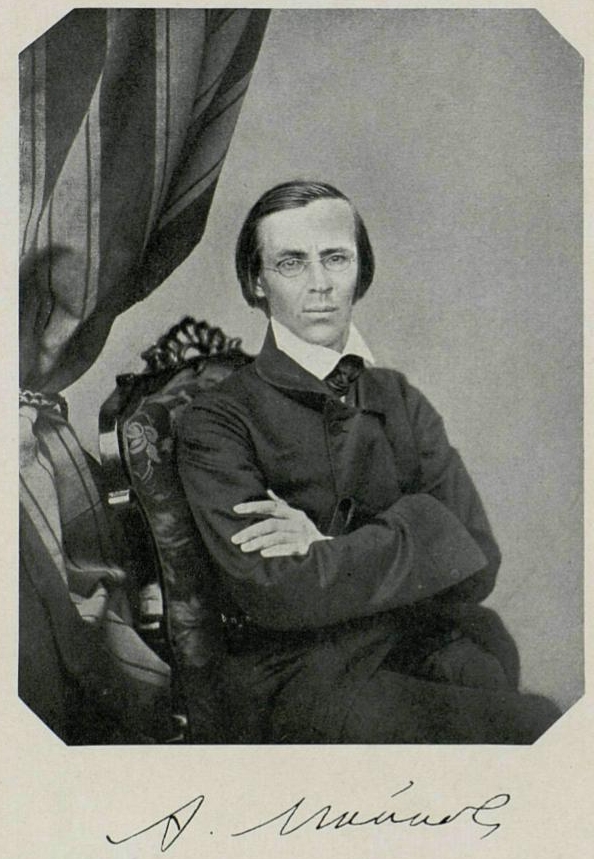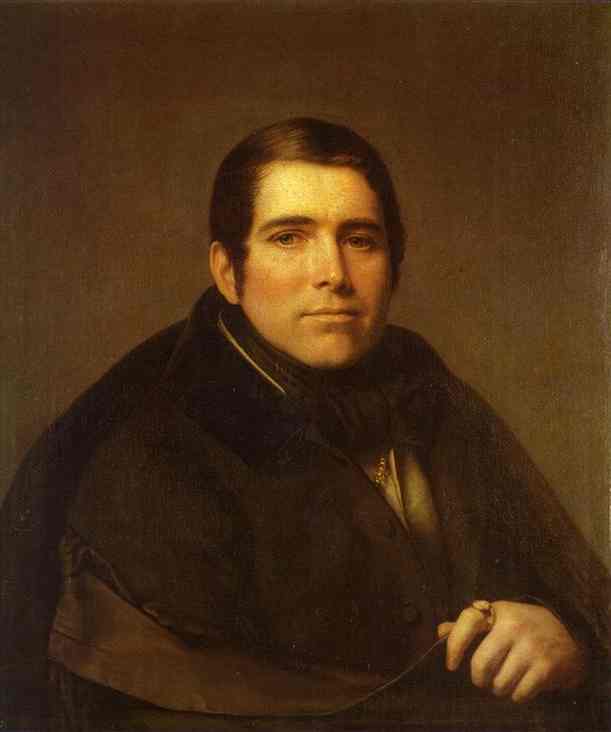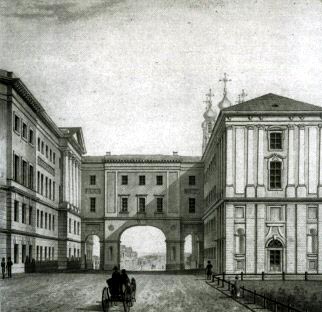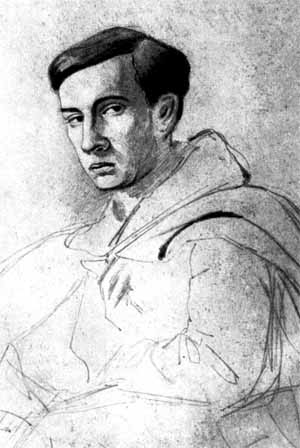|
Pleshcheyev
Aleksey Nikolayevich Pleshcheyev (russian: link=no, Алексе́й Никола́евич Плеще́ев; 8 October 1893) was a radical Russian poet of the 19th century, once a member of the Petrashevsky Circle. Pleshcheyev's first book of poetry, published in 1846, made him famous: "Step forward! Without fear or doubt..." became widely known as "a Russian ''La Marseillaise''" (and was sung as such, using French melody), "Friends' calling..." and "We're brothers by the way we feel..." were also adopted by the mid-1840s' Russian radical youth as revolutionary hymns. In 1849, as a member of Petrashevsky Circle, Pleshcheyev was arrested, sent (alongside Fyodor Dostoyevsky among others) to Saint Petersburg and spent 8 months in Peter and Paul Fortress. Having initially been given a death sentence, Pleshcheyev was then deported to Uralsk, near Orenburg where he spent ten years in exile, serving first as a soldier, later as a junior officer. In his latter life, Pleshcheyev became ... [...More Info...] [...Related Items...] OR: [Wikipedia] [Google] [Baidu] |
Petrashevsky Circle
The Petrashevsky Circle was a Russian literary discussion group of progressive-minded intellectuals in St. Petersburg in the 1840s. It was organized by Mikhail Petrashevsky, a follower of the French utopian socialist Charles Fourier. Among the members were writers, teachers, students, minor government officials and army officers. While differing in political views, most of them were opponents of the tsarist autocracy and Russian serfdom. Like that of the Lyubomudry group founded earlier in the century, the purpose of the circle was to discuss Western philosophy and literature that was officially banned by the Imperial government of Tsar Nicholas I. Among those connected to the circle were the writers Dostoevsky and Saltykov-Shchedrin, and the poets Aleksey Pleshcheyev, Apollon Maikov, and Taras Shevchenko. Nicholas I, alarmed at the prospect of the revolutions of 1848 spreading to Russia, saw great danger in organisations like the Petrashevsky Circle. In 1849, members of the Circ ... [...More Info...] [...Related Items...] OR: [Wikipedia] [Google] [Baidu] |
Fyodor Dostoyevsky
Fyodor Mikhailovich Dostoevsky (, ; rus, Фёдор Михайлович Достоевский, Fyódor Mikháylovich Dostoyévskiy, p=ˈfʲɵdər mʲɪˈxajləvʲɪdʑ dəstɐˈjefskʲɪj, a=ru-Dostoevsky.ogg, links=yes; 11 November 18219 February 1881), sometimes transliterated as Dostoyevsky, was a Russian novelist, short story writer, essayist and journalist. Dostoevsky's literary works explore the human condition in the troubled political, social, and spiritual atmospheres of 19th-century Russia, and engage with a variety of philosophical and religious themes. His most acclaimed novels include ''Crime and Punishment'' (1866), ''The Idiot'' (1869), ''Demons'' (1872), and ''The Brothers Karamazov'' (1880). His 1864 novella, ''Notes from Underground'', is considered to be one of the first works of existentialist literature. Numerous literary critics regard him as one of the greatest novelists in all of world literature, as many of his works are considered highly influen ... [...More Info...] [...Related Items...] OR: [Wikipedia] [Google] [Baidu] |
Apollon Maykov
Apollon Nikolayevich Maykov (russian: Аполло́н Никола́евич Ма́йков, , Moscow – , Saint Petersburg) was a Russian poet, best known for his lyric verse showcasing images of Russian villages, nature, and history. His love for ancient Greece and Rome, which he studied for much of his life, is also reflected in his works. Maykov spent four years translating the epic ''The Tale of Igor's Campaign'' (1870) into modern Russian. He translated the folklore of Belarus, Greece, Serbia and Spain, as well as works by Heine, Adam Mickiewicz and Goethe, among others. Several of Maykov's poems were set to music by Russian composers, among them Rimsky-Korsakov and Tchaikovsky. Maykov was born into an artistic family and educated at home, by the writer Ivan Goncharov, among others. At the age of 15, he began writing his first poetry. After finishing his gymnasium course in just three years, he enrolled in Saint Petersburg University in 1837. He began publishing his poem ... [...More Info...] [...Related Items...] OR: [Wikipedia] [Google] [Baidu] |
Sergei Rachmaninoff
Sergei Vasilyevich Rachmaninoff; in Russian pre-revolutionary script. (28 March 1943) was a Russian composer, virtuoso pianist, and conductor. Rachmaninoff is widely considered one of the finest pianists of his day and, as a composer, one of the last great representatives of Romanticism in Russian classical music. Early influences of Tchaikovsky, Rimsky-Korsakov, and other Russian composers gave way to a thoroughly personal idiom notable for its song-like melodicism, expressiveness and rich orchestral colours. The piano is featured prominently in Rachmaninoff's compositional output and he made a point of using his skills as a performer to fully explore the expressive and technical possibilities of the instrument. Born into a musical family, Rachmaninoff took up the piano at the age of four. He studied with Anton Arensky and Sergei Taneyev at the Moscow Conservatory and graduated in 1892, having already composed several piano and orchestral pieces. In 1897, following the d ... [...More Info...] [...Related Items...] OR: [Wikipedia] [Google] [Baidu] |
Nikolay Speshnev
Nikolay Alexandrovich Speshnev (Russian: Николай Александрович Спе́шнев; 1821, Kursk - 1882, St. Petersburg) was a 19th-century Russian aristocrat and political activist, best known for his involvement with the pro-socialist literary discussion group the Petrashevsky Circle. He formed a secret revolutionary society from among the members of the circle, which included the young Fyodor Dostoevsky. After the government of Tsar Nicholas I arrested the members of the Petrashevsky Circle in 1849, Speshnev was interrogated, threatened with torture, and eventually sentenced, along with Dostoevsky, Petrashevsky and others, to execution by firing squad. The sentence was commuted to hard labour in Siberia, but the prisoners were only informed of this after enduring a mock execution. Dostoevsky drew on his experiences with Speshnev's secret society and the Petrashevsky Circle when writing his socio-political satire ''Demons''. The novel's central character—Nikolay ... [...More Info...] [...Related Items...] OR: [Wikipedia] [Google] [Baidu] |
Sergey Durov
Sergey Fyodorovich Durov (russian: Серге́й Фёдорович Ду́ров, 1816, Oryol Governorate, Russian Empire - December 18 [o.s. 6], 1869, Poltava, Ukraine, then Russian Empire) was a Russian poet, translator, writer, and political activist. A member of the Petrashevsky Circle and later the leader of his own underground group of intellectuals, Durov was arrested in 1849 and spent 8 months in the Petropavloskaya Fortress, followed by 4 years in Omsk prison. Durov returned from Siberia in 1857, and the ban on his literary activity was lifted in 1862. But, broken physically by his long ordeal, he fell critically ill soon after and died at the age of 54. Biography Sergey Fyodorovich Durov was born in the Oryol Governorate in the family of a minor nobleman. His father, an army colonel, died penniless in 1834. The boy's education in the Nobility Boarding school at the Saint Petersburg University (1828-1833) was paid for by his uncle on his mother side, Nikolai Khmelnitsky, ... [...More Info...] [...Related Items...] OR: [Wikipedia] [Google] [Baidu] |
André Chénier
André Marie Chénier (; 30 October 176225 July 1794) was a French poet of Greek and Franco-Levantine origin, associated with the events of the French Revolution of which he was a victim. His sensual, emotive poetry marks him as one of the precursors of the Romantic movement. His career was brought to an abrupt end when he was guillotined for supposed "crimes against the state", just three days before the end of the Reign of Terror. Chénier's life has been the subject of Umberto Giordano's opera '' Andrea Chénier'' and other works of art. Life Chénier was born in the Galata district of Constantinople. His family home, destroyed in a fire, was located on the site of the present Saint Pierre Han, in today's Karaköy neighborhood of Istanbul. His father, Louis Chénier, a native of Languedoc, after twenty years in the Levant as a cloth-merchant, was appointed to a position equivalent to that of French consul at Constantinople. His mother, Élisabeth Santi-Lomaca, whose sister wa ... [...More Info...] [...Related Items...] OR: [Wikipedia] [Google] [Baidu] |
Hugues Felicité Robert De Lamennais , a Welsh given name
{{hndis ...
Hugues may refer to People: * Hugues de Payens (c. 1070–1136), French soldier * Hugues I de Lusignan (1194/95 –1218), French-descended ruler a.k.a. Hugh I of Cyprus * Hugues IV de Berzé (1150s–1220), French soldier * Hugues II de Lusignan (1252/53 –1267), French-descended ruler a.k.a. Hugh II of Cyprus Other: * Hugues (given name) and people bearing it See also * Hugh (other) * Hughes (other) * Huguette, a French given name * Huw Huw is a Welsh given name, a variant of Hugo or Hugh. Notable people with the name include: * Huw Bennett (born 1983), Welsh rugby player *Huw Bunford (born 1967), guitarist in the Welsh rock band Super Furry Animals * Huw Cadwaladr, Welsh poet * ... [...More Info...] [...Related Items...] OR: [Wikipedia] [Google] [Baidu] |
Saint Petersburg University
Saint Petersburg State University (SPBU; russian: Санкт-Петербургский государственный университет) is a public research university in Saint Petersburg, Russia. Founded in 1724 by a decree of Peter the Great, the university from the beginning has had a focus on fundamental research in science, engineering and humanities. During the Soviet period, it was known as Leningrad State University (russian: Ленинградский государственный университет). It was renamed after Andrei Zhdanov in 1948 and was officially called "Leningrad State University, named after A. A. Zhdanov and decorated with the Order of Lenin and the Order of the Red Banner of Labour." Zhdanov's was removed in 1989 and Leningrad in the name was officially replaced with Saint Petersburg in 1992. It is made up of 24 specialized faculties (departments) and institutes, the Academic Gymnasium, the Medical College, the College of Physical Culture ... [...More Info...] [...Related Items...] OR: [Wikipedia] [Google] [Baidu] |
Pyotr Pletnyov
Pyotr Alexandrovich Pletnyov (russian: Пётр Александрович Плетнёв; , Tebleshi, Tver Governorate — ) was a minor Russian poet and literary critic, who rose to become the dean of the Saint Petersburg University (1840–61) and academician of the Petersburg Academy of Sciences (1841). Pletnyov befriended the poet Alexander Pushkin, who dedicated his novel in verse ''Eugene Onegin'' to him. After Pushkin's death in 1837, Pletnyov edited his literary journal ''Sovremennik'' until the latter was sold to Nikolai Nekrasov in 1846. As a critic, he was strongly opposed to Vissarion Belinsky and like-minded journalists who placed "progressive ideas" above the artistic mastership. With Sergey Uvarov's support, Pletnyov gained many teaching assignments, in and around Saint Petersburg, including in the end a tutor's post to the future Alexander II. His non-partisan view of various literary movements helped him to single out and applaud all of the most gifted wri ... [...More Info...] [...Related Items...] OR: [Wikipedia] [Google] [Baidu] |
Mikhail Saltykov-Schedrin
Mikhail Yevgrafovich Saltykov-Shchedrin ( rus, Михаи́л Евгра́фович Салтыко́в-Щедри́н, p=mʲɪxɐˈil jɪvˈɡrafəvʲɪtɕ səltɨˈkof ɕːɪˈdrʲin; – ), born Mikhail Yevgrafovich Saltykov and known during his lifetime by the pen name Nikolai Shchedrin ( rus, Николай Щедрин), was a major Russian writer and satirist of the 19th century. He spent most of his life working as a civil servant in various capacities. After the death of poet Nikolay Nekrasov, he acted as editor of a Russian literary magazine ''Otechestvenniye Zapiski'' until the Tsarist government banned it in 1884. In his works Saltykov mastered both stark realism and satirical grotesque merged with fantasy. His most famous works, the family chronicle novel ''The Golovlyov Family'' (1880) and the political novel ''The History of a Town'' (1870) became important works of 19th-century fiction, and Saltykov is regarded as a major figure of Russian literary Realism. Bi ... [...More Info...] [...Related Items...] OR: [Wikipedia] [Google] [Baidu] |
Dmitry Grigorovich
Dmitry Vasilyevich Grigorovich (russian: Дми́трий Васи́льевич Григоро́вич) ( – ) was a Russian writer, best known for his first two novels, '' The Village'' and '' Anton Goremyka'', and lauded as the first author to have realistically portrayed the life of the Russian rural community and openly condemn the system of serfdom. Biography Dmitry Grigorovich was born in Simbirsk to a family of the landed gentry. His Russian father was a retired hussar officer, his French mother, Cydonia de Varmont, was a daughter of a royalist who perished on guillotine in the times of the Reign of Terror. Having lost his father early in his life, Dmitry was brought up by his mother and grandmother, the two women who hardly spoke anything but French. Up until the age of eight the boy had serious difficulties with his Russian.Meshcheryakov, V. The Introduction to the Selected Works by D.V.Grigorovich. Moscow. Khudozhestvennaya Literatura Publishers, 1976. Pp. 527-53 ... [...More Info...] [...Related Items...] OR: [Wikipedia] [Google] [Baidu] |









